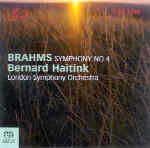When he’s “on”, Bernard Haitink is such a sincere, musical conductor that it’s distressing just how patchy his work seems to be nowadays. Take this Brahms for example, the completion of what in the final analysis is a decent if lackluster complete cycle (Haitink’s third!). The first movement opens with exceptional finesse and chamber-music transparency of texture, at a perfectly flowing tempo. Haitink’s characterful touches in terms of phrasing and accent never break the long line, and up to the transition to the second subject, work beautifully. Then comes that tango-like transition theme in the cellos, and the rhythm stiffens, the music bogs down, and the entire passage comes off as flat as it ever could. There’s no increase in tension, indeed no reaction at all to the change of tone or texture. And so it goes throughout the performance.
The Andante moderato contains some really exquisitely sensitive playing from the LSO winds and strings, but the big climax lacks fire even as the second subject in the violins (particularly on its culminating appearance just before the movement’s end) contains a full measure of Brahmsian rapture. Happily, the scherzo has plenty of swagger and gusto, with Haitink’s keen ear for instrumental balances ensuring that even the quiet presence of the piccolo registers cleanly, but without obtrusive spotlighting. Alas the finale, though ample in sobriety and gravitas, loses steam as it goes. I simply don’t understand why Haitink ignores Brahms’ instruction to pick up the tempo in the closing pages: sure, you don’t have to go as nuts as Furtwängler, but the music has to convey an active sense of range. Haitink is far too passive-aggressive.
A mixed bag, then, from a serious (too serious?) conductor who, at least at one point in his career, proved himself capable of better things. The LSO plays well and clearly gives Haitink everything he wants, and the sound in both stereo and multichannel formats is a touch dry but clear and very well balanced. The problem is that Haitink should want more, and I suspect that most listeners will as well.
































